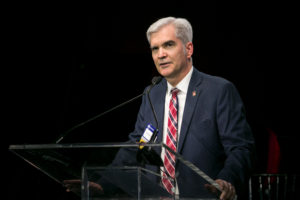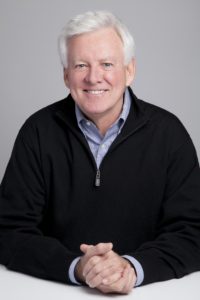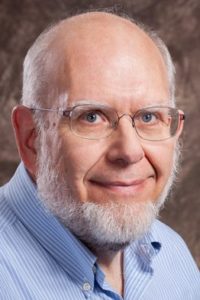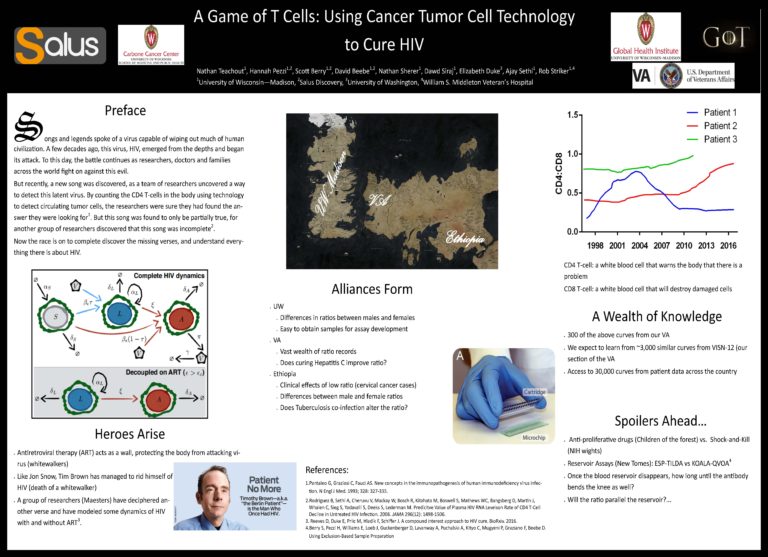2018’s 11th Annual Research Retreat!
[tribe_event_inline id=”4877″]
UWCCC Research Retreat
Time: Thursday, {start_date} @ {start_time} – {end_time}
Location: {venue}
[/tribe_event_inline]
The 2018 UWCCC Research Retreat was an opportunity for cancer center members, research personnel, and students alike to learn more about the great research happening at the Outstanding UW Carbone Cancer Center.
![]()
Agenda
This is an accordion element with a series of buttons that open and close related content panels.
1:30 Registration & Poster Setup
Registration and poster setup will commence in the HSLC Atrium
2:00 Opening Remarks

UW Carbone Cancer Center Director, Dr. Howard Bailey, MD
2:15 Keynote Presentation

Dr. Gary Tarpley, PhD – “Enabling Tools for Cancer Research”
Dr. Tarpley received his PhD in Oncology from the McArdle Laboratory working with Drs. James A. and Elizabeth C. Miller in chemical carcinogenesis. He conducted postdoctoral work with Howard M. Temin in tumor virology also at the McArdle Lab. Dr. Tarpley has over 20 years of experience in the discovery and clinical evaluation of novel antiviral, antibacterial and oncologic drugs in the pharmaceutical industry. In 2003, Dr. Tarpley joined the Promega Corporation as Vice President of R&D focused on the discovery of novel tools which enable life sciences research.
3:00 Concurrent Sessions
Session A: Next-Generation Analysis of Tumor Heterogeneity: Mechanisms, Therapeutics and Enabling Technologies
Emery Bresnick, PhD, Mark Burkard, MD, PhD, Richard Halberg, PhD, Christina Kendziorski, PhD
While tumor heterogeneity has been studied for years, recent innovations in forging systems and technologies have uniquely enabled studies to model heterogeneity in vivo, discover mechanisms underlying heterogeneity and devise personalized therapeutic approaches. These studies often involve assays to establish genome structure/function in single cells and unique animal models to gain insights of fundamental and clinical/translational importance. The goals of this breakout session are to share UWCCC efforts within this realm, identify common threads that may be leveraged to build multi-investigator initiatives and identify deficiencies that can be overcome to increase the impact and scope of these studies. Richard Hallberg will address biological systems and mechanisms of tumor heterogeneity, Mark Burkard will discuss therapeutic challenges imposed by heterogeneity, and Christina Kendziorski will explore technological innovation. Following these brief presentations, we will break-out into subgroups, and facilitators will lead discussions on issues related to systems/mechanisms, therapeutics, technologies and obstacles/opportunities. We encourage all UWCCC trainees, staff and faculty to participate and share their ideas and experiences.
Session B: Immunotherapy Collaborative Research Opportunities
Mark Albertini, MD, Natalie Callander, MD, David Vail, DVM, Irene Ong, PhD, Josh Lang, MD
The goal of this breakout session is to enhance initiatives in translational immunotherapies at the UWCCC. The UWCCC Immunology-Immunotherapy Working Group recently announced a Request For Proposals (RFP) for the first UWCCC Interdisciplinary Cancer Immunology-Immunotherapy Pilot Project Competition (Applications due May 14, 2018). This RFP was made possible by a recent generous gift from Dr. and Mrs. Ernest Borden and additional funding from the UWCCC. This breakout session will provide a forum for discussion of 1) this UWCCC Immunology-Immunotherapy Working Group RFP, and 2) additional collaborative immunotherapy research opportunities at the UWCCC. Presentations will be provided by Dr. David Vail (Opportunities with the new Comparative Oncology Research Consortium (CORC)), Dr. Irene Ong (Informatics at the UWCCC), and Dr. Joshua Lang (Immune evasion and related biomarkers in prostate cancer and microfluidic co-culture models). An open discussion will follow these presentations to discussion resource needs to enhance immunotherapy initiatives at the UWCCC.
Session C: Building a Liver Cancer Working Group at the UWCCC
Sharon Weber, MD, Session Leader
As liver cancer rates in the US increase, new research questions are emerging, and the NCI is investing in team science projects on this topic. The goal of this breakout session is to begin to build a multi-disciplinary working group of clinicians and researchers to respond to new funding opportunities in the liver cancer field, such as this recent announcement: Epidemiologic Research on Emerging Risk Factors and Liver Cancer Susceptibility. Leaders in the research and treatment of liver cancer, including Drs. Sharon Weber, Dan Abbott, Adnan Said, and John Rice, will lead small-group discussions to identify UW strengths in liver cancer research and potential areas of focus for proposals. Anyone interested in any facet of liver cancer research is welcome to attend and contribute.
Session D: Imaging from Cells to Patients
Steve Cho, MD, Jamey Weichert, PhD, Beth Weaver, PhD
Imaging has become an indispensable tool in the study of cancer biology and in clinical prognosis and treatment. The goal of this session is to explore cancer imaging across the spectrum of 1) live cell imaging, 2) small animal/preclinical imaging, and 3) clinical imaging. Dr. Beth Weaver, Cell and Regenerative Biology, Dr. Jamey Weichert, Radiology, Director of the UWCCC Small Animal Imaging Facility and Dr. Steve Cho, Radiology clinician and Director of the UWCCC Clinical Research Imaging Core will highlight stories of successful collaborative science as well as imaging personnel and resources at UWCCC.
3:45 Resource Fair & Networking
UW Carbone Cancer Center Resources are available to answer questions and present, including:
- Cancer Health Disparities Initiative
- WI Comprehensive Cancer Control Program
- Clinical Research Central Office
- Development
- IT4C Information Tech for Cancer
- Marketing
- Office of Translational Research Services
- Pre-award
- Shared Resources
*Includes snacks and coffee
4:30 Keynote Presentation

Dr. Stephen Meyn presents “Precision genomic medicine: the future is already here”
Dr. Stephen Meyn was educated at Princeton University and earned his MD degree and a PhD in Basic Medical Sciences from New York University. He completed a residency in Pediatrics at the University of California, San Francisco and then fellowships in Medical Genetics at the National Institutes of Health. After 11 years on the Faculty of Yale University, he was appointed a Professor of Paediatrics and Molecular Genetics at the University of Toronto in 1998. While in Toronto he served as Head of the Program in Genetics and Genome Biology at the Hospital for Sick Children. He also co-led the Hospital for Sick Children’s Cancer Genetics Program and Genome Clinic Project, which has pioneered the use of diagnostic and predictive whole genome sequencing in children. In 2017 Dr. Meyn was recruited to UW-Madison where he is the inaugural Director of the Center for Human Genomics and Precision Medicine. Dr. Meyn’s work has spanned the full range of genetics research – from fundamental studies of DNA repair and telomere biology to evaluations of the clinical applications of whole genome sequencing and the ethics of predictive genetic testing.His current research focuses on two of the major challenges in genomic medicine: discovering new disease genes and developing high-throughput methods for rapidly identifying pathogenic genomic variants.
5:00 Developing and Winning Large Grants
5:00 – 5:30 Developing and Winning Large Grants
Paul Lambert, PhD, Michael Fiore, MPH, MD, David Jarrard, MD, Rick Moss, MD
This interactive discussion section will cover:
- Why large grants are important
- Tips for putting together a collaborative, interdisciplinary,translational cancer research proposal
- Institutional support for large grants
5:30 Closing Remarks
Closing remarks from Dr. Howard Bailey
5:35 Scientific Poster Viewing & Reception
Reception includes appetizers and beverages.
Over 90 scientific posters will highlight the exciting and diverse research being done by Carbone Cancer Center researchers.

